Yoni Vyapad (Utero-vaginal disorders) chapter in Ayurveda mentions different diseases related to female genitalia. Though it does not mention any collection of symptoms like PCOD or PCOS, it tackles all those symptoms as different disorders that have specific treatments. Mentions are found referring to Artava Vyapad (irregular periods), Sthoulya (obesity), Prameha (pre-diabetic obesity related metabolic syndrome which is also related to Sthoulya), Vandhyatva (anovulation) and Mukshadoshika (acne problem).
According to Vedic texts, Shukra Dhatu (which is a combination of oestrogen and androgen) is present in different balances in both males and females. It is very essential in maintaining reproductive health in both sexes. When Shukra Dhatu is disturbed due to any reason, reproductive issues occur.
One such reason is vitiated Vata dosha (Vata dosha thrown out of balance) which causes Mamsa (muscle tissue), Rakta (blood tissue) and Medha (fatty adipose tissue) to form Granthi(swelling or cysts). Thus Ayurvedic approach to correct these problems is by balancing Vata dosha by Deepana pachana (enlightening weakened digestive fire), performing purification processes via Panchakarma and pacifying Vata and Kapha doshas as these are the root of all illnesses mentioned here.
As we know of modern science today, PCOD manifests when hormonal imbalance jeopardizes ovarian cycle in a way that ovarian follicles are not able to get released from the ovary (which should happen in a normal menstrual cycle) and thus remain there and become fluid-filled cysts with or without immature eggs inside. While PCOD has a familial tendency, it is now considered a lifestyle disorder like Diabetes or Hypertension and can be avoided and treated with a healthy and disciplined lifestyle approach. Words like PCOS and PCOD are usually used interchangeably by people but there is a small difference between the two:
PCOD– Poly cystic Ovarian Disease is charachterized by menstrual disorder (irregularity and long cycles) along with symptoms of Androgen (male hormone) excess which are male like facial hair development, pigmentation and disproportionate weight gain in relation to food-intake. Here, higher levels of androgen or male hormones prevent the ovaries from making normal eggs (one capable of ovulation).
PCOS– Poly cystic Ovarian Syndrome is charachterized by symptoms of Androgen excess as explained in PCOD but with or without the presence of menstrual irregularities. Here ovaries develop follicles with immature eggs but they may be fluid-filled and fail to release eggs during every period. Thus it is a PCOD like SYNDROME and bad lifestyle has a major role in its development too.
Symptoms of PCOD are:
- Irregular periods
- Heavy periods as the lining of uterus falls after long times.
- Acne on face, chest and back.
- Fluid retention.
- Mood swings and depression.
- Male like hair growth pattern named Hirsuitism like face, chest, back.
- Weight gain
- Headaches may be present in some women.
- Scalp hair baldness as seen in men.
- Darkening of skin may occur in skin folds of groin, breasts or neck.
Other than hormonal imbalance, Insulin resistance and inflammation are notorious features associated with the cases of PCOD and PCOS. It is seen that these patients are more prone to inflammation inside body. Around 70% of patients have insulin-resistance which means that their body is not able to use available insulin which is normally produced by pancreas. This leaves the body to think that there is a lack of insulin and thus it triggers pancreas to produce more insulin. This excess of insulin in body acts as a trigger on ovaries to produce androgens.
Allopathy targets its line of treatment on:
- Correcting hormonal imbalance with Contraceptive pills (which are essentially female hormonal pills).
- Trying to reduce insulin resistance with the help of Metformin.
- Eating healthy and exercising.
Ayurvedic treatment is based on Cyst dissolution which is not a symptomatic treatment but a root treatment. We will today discuss about best 7 herbs that help in treatment of PCOS/ PCOD both. These herbs are usually present in Ayurvedic preparations that treat PCOD.
1. Turmeric

- Turmeric is a potent anti-inflammatory and antiseptic agent and so it has been used since time immortal in ayurveda for treatment of inflammatory condition and wounds. This quality of turmeric is useful to combat inflammation at molecular level in PCOD patients.
- Studies show that Turmeric’s active ingredient Curcumin decreases insulin resistance.
- Turmeric helps to detoxify liver by stimulating bile production in gallbladder. A healthy liver will eliminate excess toxins and excess hormones more efficiently in the body. Hence usefulness in PCOD is noted.
- Turmeric stimulates Brain derived Neurotropic factor (BDNF), serotonin and dopamine production which helps in stabilizing mood and combat depression which often occurs in PCOD/ PCOS.
- It also relieves oxidative stress in the body and is a good detoxifier. It activates body’s innate anti-oxidant enzymes too.
2. Shatavari For PCOS
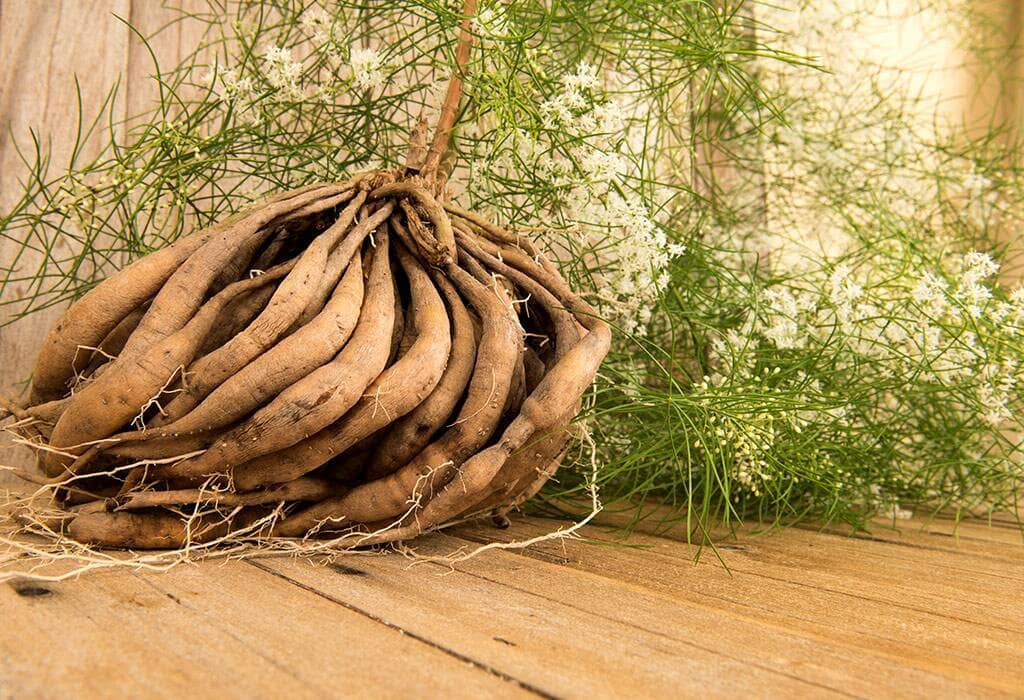
- Scientific name is Asparagus Racemosus.
- Shatavari is a great health tonic with generalized benefits ranging from memory boost, improvement of sperm health and sperm count, heart diseases, bleeding disorders, menstrual problems and inflammatory conditions.
- It is a rich source of Vit A, C, E, B1, B2, B12, iron, calcium, phosphorus and magnesium.
- Helps increase oestrogen levels.
- Improves insulin sensitivity.
- It helps in improving oxidative stress to the reproductive system and whole body. Thus egg (oocyte) quality, follicular growth and development is helped thus leading to proper ovulation. Thus it is beneficial for regulating ovulatory cycles.
- It prevents new cysts from forming and disease from progressing further.
- Phytoestrogens present in Shatavari have oestrogen-like action.
- Antioxidant property of Shatavari is also helpful for reproductive health.
- Also improves insulin-resistance and avoids hyperinsulinemia (condition where excess of insulin flows in blood).
- Supports functioning of Thyroid gland and Hypothalamus-Pituitary-ovarian axis. It helps maintain LDL levels to counter obesity.
- Also supports a healthy balance between oestrogen and progesterone.
- Maintains crucial synergism of FSH and LH for ovulation process.
- It is rich in vitamins and minerals and so beneficial for gonads.
3. Ashwagandha For PCOS
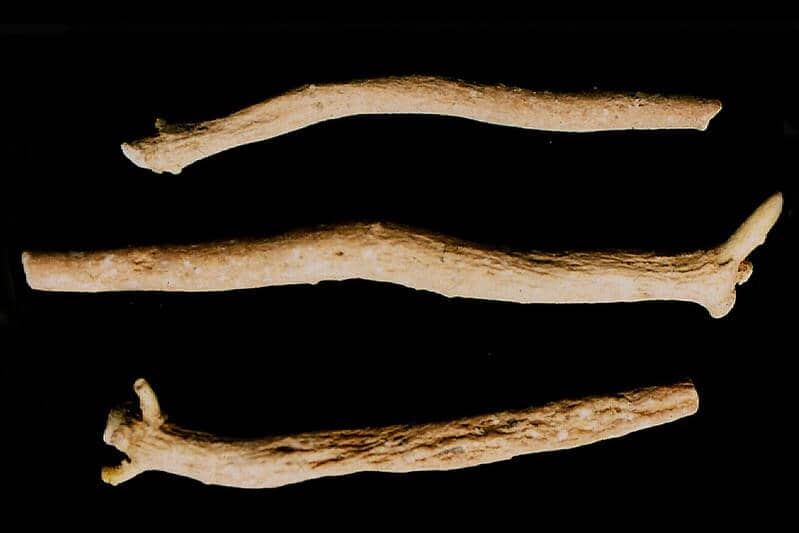
- Also named as Indian ginseng or winter berry, Ashwagandha has been used in treatment of PCOD with great success. Withania Somnifera is its scientific name.
- It reduces cholesterol, LDL and triglycerides in blood and thus attacks the contributing factor of the disease which is Obesity.
- It has been shown that it’s beneficial in creating a synergistic balance between FSH and LH and this synergism is what helps in proper follicular growth and ovulation during each menstrual cycle.
- Improves stress levels in PCOS due to its adaptogenic property. It binds to GABA receptors and provides calming effect by alleviating anxiety. Thus mood swings, stress, fatigue and depression problems associated with PCOD/ PCOS are benefitted.
- Antioxidants levels present in Ashwagandha (flavonoids and phenols) have been shown to help reduce blood sugar levels in experiments on diabetic rats.
- Certain alkaloid compounds and saponins present in this herb help to increase T4 production in thyroid.
- Cortisol levels are raised in stress conditions. This is controlled by Ashwagandha.
- Ashwagandha decoction made with milk known as “Ksheera Kashaya” is also sometimes advised for treatment. However this should not be taken by pregnant women.
- Balances thyroid and adrenal function which maintains healthy cortisol levels and also normalizes insulin levels in the blood.
4. Haritaki / Harad
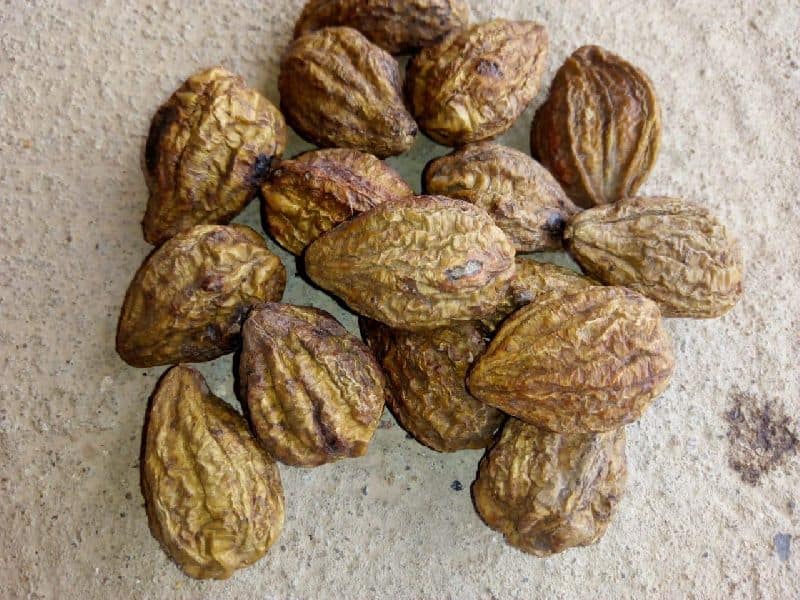
- One of the important ingredients of powerful herbal medicine Triphala. Scientific name is Terminalia Chebula.
- It has anti-inflammatory and anti-microbial actions. Thus it benefits inflammation factor present in PCOS.
- Also improves sugar metabolism and improves insulin-resistance.
- Helps to reduce weight.
- It is a rich source of Vitamin C, potassium, manganese, copper and selenium.
- Has immunomodulatory action.
5. Lodhra
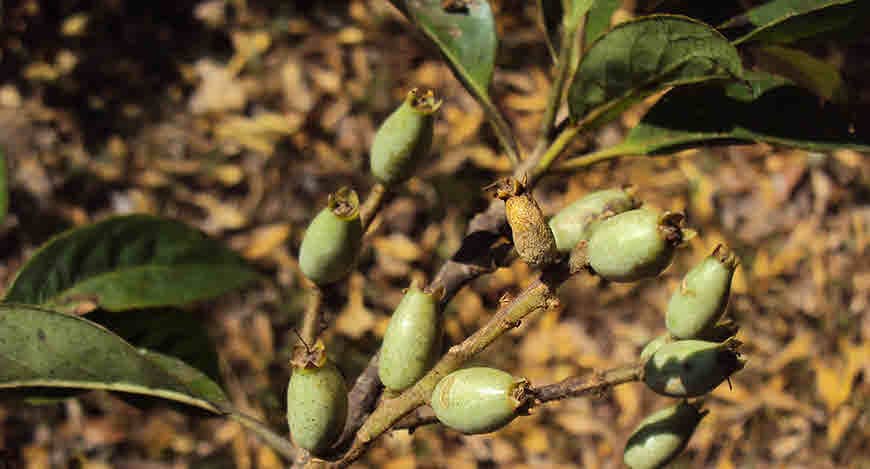
- It is rich in flavonol glycosides which help in uterine diseases.
- It helps to regulate hormonal misbalance and reduces excess male hormones.
- Astringent properties of Lodhra are beneficial in cleansing uterus and making a healthier environment.
6. Ashoka
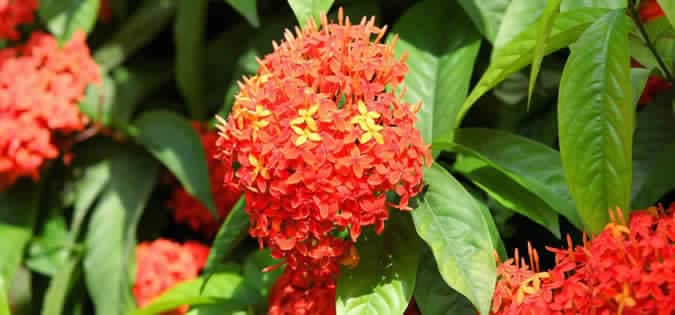
- It is a great anti-inflammatory agent which is beneficial in inflammation in uterine lining and whole body.
- It regulates menstruation and also improves hormonal imbalance by regulating good oestrogen levels.
- Anti-fungal and anti-microbial properties of Asoka help in resisting Candida infections and UTIs.
- It also benefits conditions like painful menstruation, fibroids, excessive blood flow in menstruation and cysts.
- Maintains good tone of the uterus.
7. Devadaru
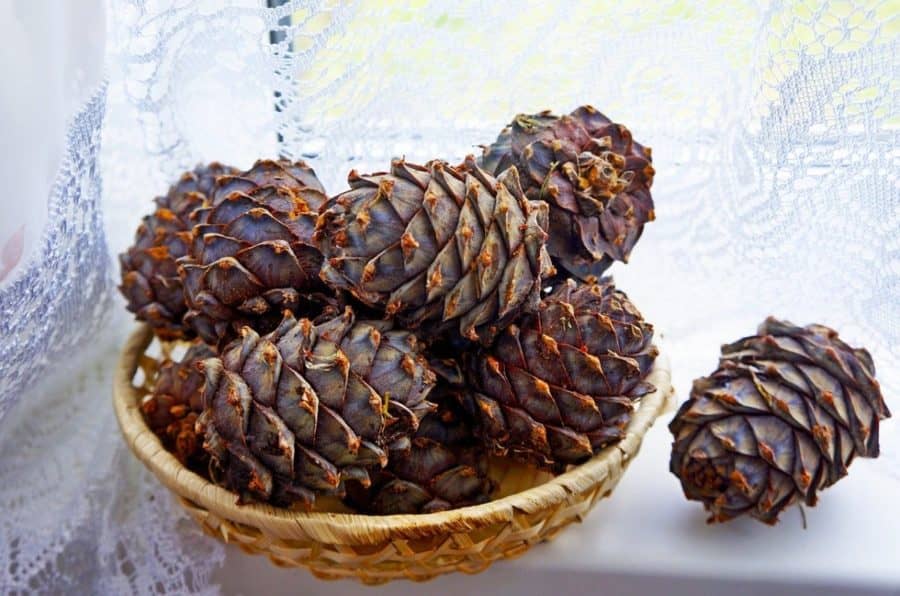
- Scientific name is Cedrus Deodara.
- Has a good anti-inflammatory activity and so beneficial in PCOD/ PCOS.
- It is a muscle relaxant and helps in menstrual cramps.
- Helps combat obesity.
- Acts against Diabetes.
Other Supportively Beneficial Herbs
Chitraka
- And ginger both help to improve digestive system’s health and reduce excess ama (toxins) formation. Hence Ama (toxins) dosha is corrected by keeping liver healthy.
- It is anti-inflammatory in nature.
- Reduces Triglycerides and cholesterol levels and hence reduce obesity.
Shilajit
- Scientifically it is purified asphaltum.
- It has potent anti-inflammatory action.
- Replenishes iron deficiency caused by bleeding in menstrual disorders.
- Good for reproductive system’s health.
Cinnamon
- Improves body’s sensitivity to insulin and normalizes blood sugar levels.
- It supports reproductive health and boosts fertility.
Varuna
- It helps to clear channels and reduce size of cysts.
Shthapushpa
- Scientific name is Foeniculum Vulgarae.
- Reduces inflammation of PCOS.
- Reduces insulin resistance in body.
Neem
- Scientific name is Azadirachta Indica.
- Helps to purify blood and regulate blood sugar levels.
Karavellaka
- Scientific name is Momordica Charantia.
- It is anti-diabetic in nature and has a bitter fruit.
- Balances inflammation and obesity commonly related to POCS.
- Regulates periods in women.
Amla / Amalaki
- Scientific name is Phyllantus emblica.
- Helps to detoxify and rejuvenate due to its scavenging action on free radicals.
- Has anti-inflammatory action.
- Restores hormonal imbalance in body.
Tulsi
- Scientific name is Ocimum Tenuiflorum.
- Controls excess androgen levels in PCOD.
- Anti-oxidation properties are beneficial for all systems of body.
- Balances increased Insulin levels related to POCS.
Ghrit Kumari / Aloe Vera
- Phyto-components present in Aloevera have been linked to restore ovarian hormonal status but studies are still going on.
Liquorice
- Scientific name is Glycyrrhiza glabra.
- Normalizes increased testosterone levels in women with PCOD. Thus it is great as an adjuvant therapy in females showing signs of male hormones excess like male pattern baldness and hirsuitism (hair growth on body).
PCOD or PCOS are also treated via Ayurvedic treatment involving:
- Shamana– method to remove toxins and restoring imbalances of doshas. This includes food intake, lifestyle changes, proper use of herbs and right exercising habits.
- Shodana– purifying by removal of unwanted toxins in the body.
- Tarpana– providing divine offerings to Deities.
Apart from the use of herbs, ayurveda takes a broader approach for PCOD correction by reducing stress levels via meditation and yoga. Certain useful poses in yoga for PCOD include Chakki chalanasana (Mill-churning pose), Bhadradvajasana (Bhadradvaja’s pose), Supta Baddha Konasana (Reclining butterfly pose), Naukasana (Boat pose), Surya namaskar (sun salutation), Bhujangasana (Cobra pose), Mayurasana (Peacock pose), Padmasana (Lotus pose), Shalabhasana (Locust pose), Pranayama (breathing exercises) and Shavasana (Corpse pose). Meditation routines like Sahaja yoga, panchakosha and alpha meditation are beneficial. Additionally a careful watch is essential on the food intake or diet of PCOD patients. All these measures also help women suffering from fertility issues related to this condition.
Uttarabasti is also a beneficial procedure for these patients. This is an enema where medicated oil decoction (like Sahcharadi taila) is introduced via vaginal route for cleansing and detoxifying purposes. However all these treatments should be strictly under the care and advice of an experienced Ayurvedic practitioner.
Precautions:
- Turmeric can cause nausea, diarrhoea and indigestion if taken in excess. So need to take carefully.
- Turmeric should not be taken too regularly by people taking anti-coagulant medications and it is also an anti-coagulant in itself and thins out blood. Those who require frequent monitoring of INR should take turmeric with utmost care and on expert’s advice.
Did you find this post useful? Would you like to get back to it later? Save THIS PIN below to your Pinterest Natural Living or Ayurveda board!

